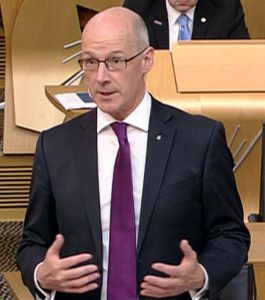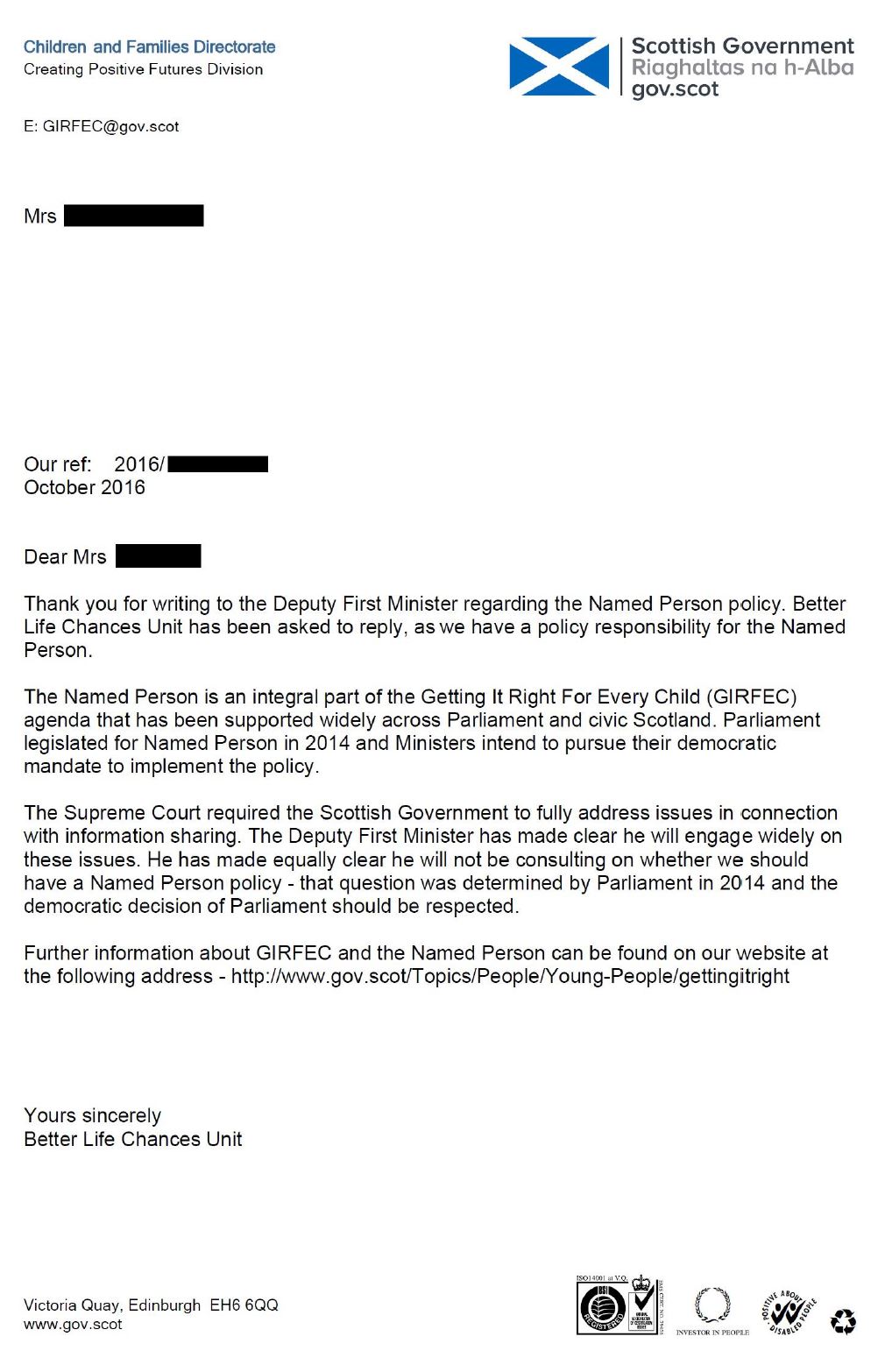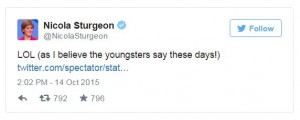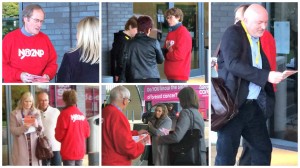Blog
Keeping you up to date on the progress of the Named Person scheme and the NO2NP campaign.
NO2NP ACTION DAYS: SNP CONFERENCE, ABERDEEN
Posted 9 years agoWith the Government stubbornly ploughing ahead with a much more limited form of the Named Person scheme and much confusion still surrounding it, a team of NO2NP volunteers organised an Action Day outside the SNP’s Spring Party Conference in Aberdeen last weekend.
Delegates were given the new NO2NP Parents’ Guide to the Named Person Scheme, which is an easy-to-read 4-page leaflet to help parents understand their rights following the Supreme Court judgment.
As the legislation was declared unlawful by the Supreme Court and a breach of human rights, one NO2NP volunteer asked a delegate: “But don’t you believe in human rights?” The delegate’s response, “Yes, but not YOUR kind of human rights!” was disappointing.
A majority of those attending the conference did take a leaflet and a number of those we met were against the Named Person scheme. A senior union official declared himself completely against the scheme and a children’s work professional criticised the much-lauded Highland Pathfinder (the first Named Person pilot scheme).
One man acknowledged he “admired [our] persistence”, while another said that no other organisation produces as many different leaflets as NO2NP does – perhaps that’s one of the reasons why we won The Herald’s Public Campaigner of the Year Award!
A huge thank you to the hardy volunteers who persevered through thick and thin over the weekend! If you would like print copies of our new Parents’ Guide to distribute, please get in touch with us by emailing: admin@no2np.org.
Swinney accused of snubbing concerned parents and constituents
Posted 9 years agoDeputy First Minister John Swinney has been accused of arrogance for ignoring concerned parents and constituents over the Named Person scheme.
Large numbers of parents contacted Mr Swinney in his capacity as education minister, urging him to hold public meetings where he can be questioned over the Named Person, following the Supreme Court ruling against the scheme earlier this year.
But parents have been disappointed to receive anonymous, dismissive, standard replies from a Government department calling itself the ‘Better Life Chances Unit’.
After the Supreme Court defeat, Mr Swinney pledged a three-month period of “intense engagement” – including parents and those with ‘concerns’ – in a consultation process designed to come up with alternative proposals which might meet the approval of the court.
But he ruled out meeting with NO2NP, whose members warned more than two years ago of the problems with the scheme, and brought the legal action which resulted in the Named Person law being struck down.
It has now emerged that Mr Swinney’s office has failed to properly respond to parents, including some of his own constituents, seeking to become involved in the consultation process.
Simon Calvert of NO2NP said:
“We have received complaints from numerous parents whose approaches to Mr Swinney were effectively ignored. In response to personal emails to Mr Swinney telling their stories and asking him to hold public meetings, all they got was a short, dismissive, unsigned stock reply from an unnamed official.
“Even Mr Swinney’s constituents who wrote to him have been ignored by their own elected MSP.
“We’re one month in to his three-month period of ‘intense engagement’. I don’t know who he is speaking to, but it’s certainly not ordinary parents.
“Parents feel frustrated and disappointed to be treated with such arrogance by a minister. He said he would hold an ‘open’, ‘inclusive’ dialogue which would include parents and those with concerns. These parents wrote to him within a week of that announcement. Civil servants took a month to come up with an anonymous 166-word reply that makes clear they are simply not interested in the opinions of anyone who does not support Government policy.
“They’re consulting on a law that dictates to parents, yet they don’t want to speak to any of those parents unless they are supine supporters of the minister’s plans.”
IdeaSpace debates child protection: wellbeing or a climate of fear?
Posted 9 years agoAlongside the SNP Conference in Glasgow last week, IdeaSpace hosted a fringe event debate on Friday on the subject: “Is Scottish child protection promoting wellbeing or a climate of fear?”
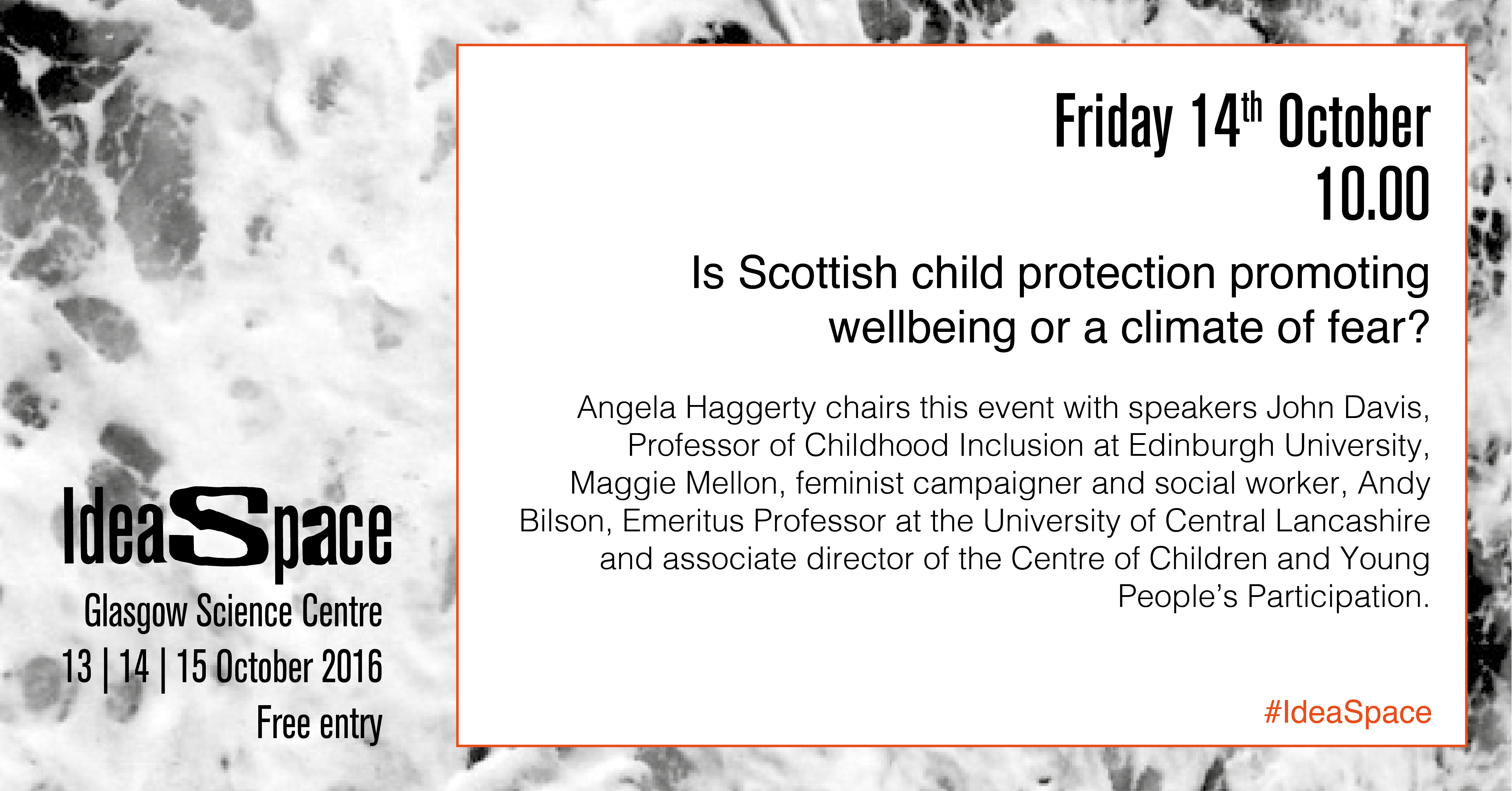
The debate’s chairperson started by saying that the Scottish Government’s Named Person policy had been the most debated subject on IdeaSpace’s website in recent times and when she later took a straw poll of the audience, those who were opposed to the scheme made up the largest group.
Social work consultant and NO2NP supporter Maggie Mellon was first to speak. She said she gave up statutory children and family work a few years ago because of the increased unnecessary intrusion into families’ lives, and the distrust between many of these families and social workers that often resulted.
She argued that the Government had “taken a wrong fork” with its legislation, which had not helped the situation and that “Named Persons are not the answer” to the very real needs of families blighted by poverty. Named Persons observe poverty as “risk” rather than “need”.
Next up was Professor Andy Bilson, Emeritus Professor of Social Work at the University of Central Lancashire, who spoke about his research into referrals under the child protection system.
He referred to a study of trends in physical abuse and neglect in six countries, focusing on children under 11, which had concluded that there was “no clear evidence for an overall decrease in child maltreatment despite decades of policies designed to achieve such reductions”.
Prof Bilson also pointed to research he had carried out in Western Australia, where, following the introduction of wellbeing legislation in 2006, referrals and reports on alleged harm had doubled over the first three years, yet there was no increase at all in the actual instances of harm.
He argued that there needs to be a new way of thinking that moves away from a singular focus on abuse and its prevention, and instead builds social capital in deprived communities and encourages advocacy and representation, rather than dictating what professionals believe to be best.
John Davis, Professor of Child Inclusion at the University of Edinburgh, started his talk by saying that he tells his social work students (jokingly!) that he is training them to become “storm troopers for the state”! He went on to say that professional interventions can make things worse and instead there needs to be minimum intervention and collaboration with parents, aiming to find support in the community, like we used to.
During Q&A, in response to a question from someone who supported Named Persons, Maggie Mellon said it was hard to define emotional abuse, and to distinguish neglect from poverty. She said that help isn’t on offer for poorer families but parents will instead end up being judged.
Prof Bilson added that if social workers go in with an orientation that looks to blame, even if they find nothing, the family will be less likely to trust them in future.
Sturgeon claims ‘Named Persons not a breach of human rights’
Posted 9 years agoFirst Minister Nicola Sturgeon has claimed during a BBC interview that the Supreme Court did not say the Named Person policy was illegal or breached human rights.
She maintained the Government spin that the bulk of the scheme is unaffected by their defeat in the Supreme Court, downplaying the court defeat as “a particular concern upheld in the Supreme Court around the data-sharing aspects of this”.
If only she had read the judgment for herself:
“the sharing of personal data between relevant public authorities is central to the role of the named person” (para. 78).
“one of the principal purposes [of the Named Person law]… was to alter the existing law in relation to the sharing of information about children and young people, so as to enable information about concerns about their wellbeing” (para. 4).
“the information-sharing provisions … are incompatible with the rights of children, young persons and parents under article 8 of the ECHR because they are not ‘in accordance with the law’ … may in practice result in a disproportionate interference with the article 8 rights of many children, young persons and their parents, through the sharing of private information … the information-sharing provisions of Part 4 of the Act are not within the legislative competence of the Scottish Parliament” (para. 106).
“…since the defective provisions are not within the legislative competence of the Parliament, they cannot be brought into force” (para. 109).
Still claiming it’s about child protection
The First Minister said her Government was “determined” to “progress with this policy … because it is about trying to protect children”. But even arch loyalists like Alistair Gaw have admitted the Named Person is “not about child protection”.
The First Minister also claimed she wanted to act “in a way that brings people together and addresses people’s concerns as we go”. Her Deputy First Minister’s refusal to consult with anyone who doesn’t agree with his policy doesn’t augur well for this.
The First Minister was responding to a question during a BBC webchat yesterday. Click here to watch the exchange.
As BBC Scotland’s political editor says to the First Minister, “Folk are still not very happy with this.”
The media and the Government know we are not going away. Let’s keep up the pressure.
Twitter’s pro-independence ‘Angry Salmond’ questions Named Person plans
Posted 10 years ago‘Angry Salmond’, who is best known for his witty political jibes promoting Scottish independence on social media, has raised concerns about the Named Person scheme in a comment piece in The National newspaper.
The man behind the popular Twitter parody account, who is now a regular columnist in The National, said it was ‘suspicious’ that the scheme has been kept “off the public radar and not openly championed as the world-beating miracle cure that its creators doubtlessly consider it to be”.
He stated: “I can’t help but notice that people who know little about Named Person seem entirely in favour of it, while impassioned researchers appear wholly against it.
He added: “I’ll concede that every child being assigned a mandatory government official who employs a “Wellbeing Wheel” to determine if the kid is happy or not certainly isn’t something parents are used to”.
Criticising the speed in which ministers pushed through the proposals, he commented: “Maybe we could have stepped cautiously toward the Named Person scheme rather than diving unwaveringly upon it with no real evidence it will improve anything.”
The columnist warned: “The Named Person idea makes people anxious that, once again, politicians are trying to put out the village fire with a tsunami”.
But Angry Salmond, like many, makes the misguided statement that “the intention of the scheme is to help vulnerable children”, and accepts that this is “a righteous idea”.
Yes, we would all agree that helping vulnerable children is “a righteous idea”. But this scheme is not about child protection as the Government would like us to believe – we wish it was that focused! Instead, it is a universal scheme to monitor the happiness of children, which is highly subjective.
Lesley Scott, the Scottish representative for The Young ME Sufferers (TYMES) Trust in a letter to The National, warned: “This dangerous legislation conflates wellbeing worries with child protection concerns, lowering the trigger for state interference to when a child’s “wellbeing” is adversely affected by any matter arising from any factor”.
She added: “The Scottish Government’s own legal team conceded that every child in Scotland is now viewed as potentially ‘vulnerable’ which holds the considerable implication that all parents are now viewed as potentially neglectful or abusive.”
On the term ‘wellbeing’ she also highlighted that even “the Scottish Government concedes that wellbeing ‘can mean different things ranging from mental health to a wider vision of happiness’.”
NO2NP AT THE SNP CONFERENCE
Posted 10 years agoAs delegates approached the Aberdeen Exhibition and Conference Centre last week for the SNP’s Autumn Conference, they were met by a friendly team of NO2NP supporters, handing out leaflets explaining why we are opposed to the Named Person scheme.
Despite the controversial policy having been pushed through the Scottish Parliament by the SNP last year, large numbers of delegates were happy to take a flyer and consider our arguments.
Surprisingly few indicated support for the scheme and a number expressed strong opposition to it. One delegate commented that the SNP had gone ahead without consulting the party membership on the matter.
A number of MSPs stopped to speak with our team, including government minister Aileen Campbell, who is responsible for the Named Person policy. She engaged in some good natured banter with our volunteers. Let’s hope she and her colleagues take note of the public concern there is about the legislation within her own party and beyond. People of all political persuasions can see that it is a gross intrusion into family life, unworkable and bad news for truly vulnerable children, who will see stretched resources diverted away from them by the universal nature of the scheme.
Do keep telling your friends to sign the petition to let the government know that more and more people are saying No to Named Persons.
NAMED PERSON SCHEME IS NO LAUGHING MATTER
Posted 10 years agoThe Guardian newspaper reports that First Minister Nicola Sturgeon is laughing off ‘big sister’ criticisms of the Named Person scheme.
Sturgeon tweeted “LOL” in response to a cartoon and article in the Spectator magazine depicting her as ‘big sister’ and referring prominently to the Named Person scheme.
A spokesman for NO2NP said the Named Person scheme was a “massive infringement of civil liberties, human rights, and involves a huge amount of data sharing”.
He stated: “There are several glaring problems with the Named Person scheme which the Scottish Government has so far failed to address or even admit.
“It is a mandated intrusion into family life and the grounds for intervention are set at the alarmingly low level of ‘wellbeing’ rather than welfare.”
He added: “There is also the disturbing prospect that appointing a state guardian for every child will massively overburden the social care system, leading to vulnerable children being missed.
“Identifying at risk children is already like looking for a needle in a haystack – the answer to the problem cannot be to make the haystack bigger.”
The Guardian also reported on our NO2NP volunteers handing out campaign leaflets to delegates going into the SNP Conference in Aberdeen, where the First Minister is due to speak for a second time tomorrow afternoon.
Source:
Nicola Sturgeon laughs off ‘big sister’ criticism of named person scheme
The Guardian, 15 October 2015
More questions than answers for GIRFEC gurus at Hampden
Posted 10 years agoAround ninety parents, children and young people gathered at Hampden Park in Glasgow last Saturday to hear the Scottish government explain what their ‘named person’ scheme is all about.
The wheels appear to have fallen off the PR wagon though, as parent after parent took Phil Raines, Head of the Scottish Government’s Child Protection Policy Team, by surprise with their ‘off-message’ feedback.
• Why had the Government ploughed ahead with this scheme given the opposition?
• Why there had been no consultations with parents before now?
• Why was Highland Council‘s Bill Alexander’s word accepted on the success of the Pathfinder, when it had clearly not worked for many?
To his credit, Mr Raines accepted they had got it wrong and there was a lot more they need to think about. But if he thought his attempt to dress up GIRFEC as being about support, not intervention (although the concept of “early intervention” is referred to frequently in the Government’s draft guidance), would put parent’s minds at rest, he was mistaken – the questions kept coming.
• How are the professionals involved going to be trained?
• How will they be taught to work together across agencies using a common language, particularly when they are currently so bad at it?
They raised the issue of too many people being involved in sharing information and pointed out that this would only get worse when the legislation comes into force next year. (No comment from Phil Raines at this point, but he was seen taking copious notes.)
Further questions were asked about the funding of the scheme and managing complaints.
• How will it be maintained?
• Where is the money coming from now? Where will it come from in the future?
But there was no action plan for the future in terms of funding – not even a plan for a plan!
• How will a Named Person and any complaints against them be reviewed and monitored and who will do the monitoring?
• Who will train the monitors?
• Where do families fit in when there is a breakdown between the monitor and the Named Person?
Lots of good questions, but no answers except: “we have to re-think; we have realised it’s a larger issue than we had thought”.
But these determined parents weren’t finished yet.
They insisted that no local authority should launch or roll-out any aspect of the scheme on their own timetable. There must be only one launch date, the programmes already being rolled out by authorities such as Perth & Kinross and Forth Valley, must be pushed back. Everyone must stop the roll out until parental agreement has been reached – it can’t be launched before that.
By this time the ‘ideas’ board at the front had so many post-it notes on it, they were falling off! No wonder it will be three months or more before they write all this up for the participants.
Next it was the turn of the GIRFEC Guide, distributed to delegates before the event, to get short shrift. You may recall from a previous NO2NP blog that this is the information pack which stated that the named person would ensure that children have “what they need to have a good life”, including a say in how their bedroom is decorated and what they watch on TV.
Several parents were extremely angry as they pointed out that the illustration for a ‘safe place’ in the guide of a modern, semi-detached two-storey home did not reflect the reality for many. Was the Government saying that those parents who brought up their children on the 14th floor of a tower block were not providing a safe place for their children?
How, they asked, could such a broad statement about what a ‘safe’ place was go out to parents? How will a named person be expected to judge a family as being in a ‘safe’ place? How realistic is it to define ‘safe’ or ‘happy’ or ‘feel good’ anyway. Answer? ‘We’ll go back and look at the imaging being used’. In other words – we’ll do some window dressing rather than sort out the real problem.
And that was the recurring theme. At the end of the day parents were left with the clear impression that when it comes to GIRFEC there are plenty of questions but precious little in the way of answers.
NO2NP Roadshow: Edinburgh highlights
Posted 11 years agoOn 23rd April the NO2NP Roadshow hosted a well-attended meeting in Portobello on the outskirts of Edinburgh. Dr Stuart Waiton chaired the event and spoke of the decline in the view of the family as an intrinsically good institution, instead it is now seen as the source of most children’s problems.
The first speaker was social work consultant Maggie Mellon, who said that it was “absurd” to assume that every child in a family “is potentially at risk and that information must be shared equally about all of them just in case”.
Then Lesley Scott of Tymes Trust, representing families of young ME sufferers, spoke about the shift in the Named Person legislation to focus on wellbeing meaning that “the threshold for intervention in a child’s life has been drastically lowered from ‘at risk of significant harm’ to that of a worry over something as intangible as wellbeing. This means that significant decisions are open to personal interpretation and bias on the part of the named person.”
Finally, Nigel Kenny of The Christian Institute gave some practical points, as well as an update on the judicial review appeal, which has now been fast-tracked to be heard by the Inner House on 3rd and 4th June.
NO2NP ROADSHOW: GLASGOW HIGHLIGHTS
Posted 11 years agoThanks to everyone who joined us in Glasgow for the NO2NP Roadshow. Representatives from the campaign shared about the many concerns surrounding the Named Person scheme.
Dr Stuart Waiton, a Sociology lecturer at Abertay University, expressed his unease about society’s increasing obsession with child safety and warned that “the autonomous family doesn’t exist any more”.
Lesley Scott of TYMES (The Young ME Suffers) Trust talked about how the Named Person scheme had its origins in the Scottish Government’s GIRFEC (Getting It Right For Every Child) principle. She also explained about the Government’s “Wellbeing Wheel” and “SHANARRI” indicators and revealed that in the Highland pilot nearly 8000 children (1 in 5) were put on a “child’s plan”.
Quoting Jane Colby, Executive Director of TYMES Trust, Lesley said “families appear to be facing an arbitrary, punitive, threatening and destructive state juggernaut” in this legislation. She concluded by warning: “This is state-mandated parenting, which obligates a state employee to carry out statutory duties, which are primarily the responsibility of parents”.
Anne Cannon, a mother of five, said she first heard about the issue through a radio phone-in and presented her two major concerns as a parent. Firstly she warned about the negative impact she believes it will have upon the relationship between parents or carers with health visitors and teachers, and secondly she said she fears that children who do actually need help may be missed.
Michael Veitch of The Christian Institute, one of the groups backing the NO2NP campaign, shared practical pointers on how people can help oppose the Named Person scheme. He also announced a new NO2NP petition which can be accessed at no2np.org. Speaking about the Scottish government’s draft guidance on the scheme, he said that it “completely fails to make reference to fathers”.
Scotland on Sunday Editorial: Named person
Posted 11 years ago
THE charge of being illiberal has been levelled at the SNP administration a number of times in recent years, notably over the heavily criticised legislation outlawing certain behaviour deemed to be offensive at football matches.
The charge has encompassed Scottish Government plans to use NHS medical records to help the taxman identify Scottish taxpayers, and the hands-off approach by former justice minister Kenny MacAskill to Police Scotland’s more authoritarian instincts.
But these controversies are as nothing compared to the public outrage at ministers’ plans to have a ‘named person’ allocated to every single child in Scotland, with the aim of protecting that child’s wellbeing. The move, while backed by the main opposition as well as children’s welfare organisations, has met enormous opposition from parents. No one would argue against the state’s right to step in when it can be shown there is the potential for harm being done to a child. We have all seen enough tragedies cross our newspaper pages – from Baby P to Mikaeel Kular – to know how important it is to have proper social work scrutiny when children are believed to be vulnerable.
But what alarms parents is the idea that the state should scrutinise every child, regardless of circumstances. Many see it as a the state overstepping a line into family life, with undue cause; in fact, with no cause at all other than the theory that any child could, in theory, one day be at risk.
The legislation – pushed though Holyrood with the benefit of the SNP’s majority – became law before anyone, not even its authors, had a clear idea of how it would work in practice. Now that the detail in becoming clear – helpfully, the Scottish Government last week issued an 111-page draft statutory guidance document – the alarm is even greater. As we reveal today, teachers are expressing concern about the role they are apparently going to be handed, and are asking what the consequences will be if something awful befalls one of ‘their’ children. How much of a reliable handle can a teacher have on the home life of every one of their pupils? Won’t some teachers over-report, and others under-report?
As we also reveal today, the legislation may be applicable to a child only from the moment of its birth, but the guidance makes clear a range of circumstances where the ‘named person’ has responsibilities concerning a child as yet unborn. Many parents, on learning about the named person legislation, thought they could safely ignore it, regardless of their opinion of it.
But it now seems every single woman who is eight months pregnant will be “offered” a meeting with their child’s named person. Can a parent safely refuse a meeting without red-flagging their family in the eyes of social workers? It seems this legislation will touch every Scottish family, whether they like it or not.
Nicola Sturgeon, in her short time as first minister, has shown herself willing to change the administration’s direction when it becomes clear the route travelled under Alex Salmond was one she took issue with. She has demonstrated this by embracing Blairite education reforms and calling Police Scotland chief constable Sir Stephen House to heel over the use of stop and search powers. Salmond was not known for his keen interest in social policy, and it is unclear whether Sturgeon’s view differs from the one by which she was bound by collective cabinet responsibility before last November. But it did not go unnoticed by Yes campaigners during the independence referendum many Scots were starting to perceive this SNP government as authoritarian and illiberal.
Does Sturgeon accept these fears are not unreasonable? If so, the time to act is now. The named person revolution is law, but how it operates is still a matter of ministerial discretion.
Press & Journal: “Flashpoint will come when state guardians start meddling with families”
Posted 11 years agoAn editorial in the popular Press & Journal newspaper has voiced strong concern about the named person scheme. In an editorial entitled ‘Extra help or nanny state gone mad?’, published on 7 February, the paper states:
“The well-meaning principle was to improve children’s lives and wellbeing but, possibly, the experts were given just a little too much latitude to tinker with it. The end result is the SNP’s ‘named person’ plan…
“Most parents would argue strongly that they don’t need any government interference, thank you very much. The Scottish Government states that a named person is only there for families who need ‘extra help’. Who decides that? Presumably, these are the same families who trigger the radar of any number of other agencies – police, social work, child protection and specialist charities – so why add another layer of bureaucracy?
“Rather than appoint a named person for every child, whether they like it or not, in the usual government scattergun approach, they should do it simply for families who actually need it. The government claims it should not take up any more time for those nominated named persons. That is surprising, as anyone who knows anything about counselling or guiding people with problems, also knows that this is time-consuming and requires special skills.
“We are told that in the Highlands, where a pilot scheme is running, the ‘vast majority’ of parents have had no contact with their named persons. So why bother? The flashpoint will come when state guardians start meddling with families who genuinely believe they are intruding unnecessarily. The policy is called ‘Getting it Right’, but it looks like they could easily get this wrong.”
JUDICIAL REVIEW: CAMPAIGNERS TO CONSIDER APPEAL AFTER JUDGE REJECTS CONCERNS
Posted 11 years agoJudge Lord Pentland, who presided over the Judicial Review, today rejected the deep-rooted concerns raised by various groups opposed to the Named Person scheme.
In a written judgment, following a four-day hearing at the Court of Session last year, he dismissed claims that the Named Person proposal breaches human rights and data protection law.
NO2NP will continue to fight against the Government’s controversial plans. All options for appeal will be considered.
“Our case is strong, as is our resolve”, said a NO2NP spokesman.
“We have the opinion of one judge on this matter but it is often the case that when such important and fundamental issues are being considered the matter goes before a bench of three or more.
“We were well aware when we embarked on this campaign that it could be a long and tortuous process involving more than one court case. We are prepared for that and are in this for the long haul.”
He added: “the judge places enormous trust in public bodies and in Government training and guidance to resolve the serious problems we are concerned with. While respecting his view, we don’t share that confidence.
“The legislation has not yet been implemented and there is no formal guidance on how it will be implemented. The judge says the impact of the Named Person provisions will very much rest on the guidance and so we will be scrutinising it in the most forensic detail when it is finally revealed.
“In effect, we are being asked to wait and see what happens in practice. That means when things do go wrong for families we will take up their individual cases to the courts and ask our judges to pick up the pieces.”
He stated: “The issue is not going away. The potential problems are not going away and No To Named Persons will not be going away.”
We will carry on our information campaign, taking our case to public meetings the length and breadth of the country against this law, which threatens every family in the land and diminishes the rights and responsibilities of mums and dads to look after their children as they see fit.
Media Coverage of the Named Person legal action
Posted 11 years agoThe much anticipated legal challenge against the Scottish Government’s controversial Named Person provisions got underway this week in Edinburgh’s Court of Session. Aidan O’Neill QC is representing the campaigners opposing the scheme and warns that plans for a Named Person for every child in Scotland is a “dangerous route to go down”.
See the latest news roundup on the court case:
Lawyer slams SNP’s state guardian project
Scottish Daily Express
Legal challenge to child guardian plan begins
The Scotsman
Legal challenge to ‘named person’ bill starts
The Herald (£)
Named person legal challenge starts
The Courier
Named guardian legal bid to start
BBC News
Named persons legal bid to start
Press and Journal
The scale of opposition to the child guardian plan suggests the SNP has got it wrong
The Telegraph
Named persons legal bid to start
The Courier
Legal fight starts over SNP ‘state guardian for every child’
The Telegraph
Challenge to child guardians law begins
The Times (£)
Named person legal challenge starts
Glasgow Evening Times
Sunday Express: Big Brother becomes a surrogate mum and dad
Posted 11 years ago
By Paula Murray
THE Scottish Government has earmarked £40million to hire an extra 500 health visitors over the next four years. They will be there, according to ministers, to offer support and advice to families with young children.
It all sounds rather sweet. But when you consider this is all to do with the scheme to appoint “state guardians” to the country’s youngsters, the development begins to appear a little sinister.
Of course, there are people who are simply no good at bringing up their children, and it is for this reason that these measures are being taken.
But the vast majority of parents are responsible mothers and fathers who want nothing but the best for their children. The idea that the state should appoint an additional pair of eyes to monitor a child’s wellbeing has echoes of China, the Soviet Union and East Germany where everybody snooped on everyone else to ensure the communist values imposed on the nation were duly appreciated and followed.
Although I am childless, I feel uneasy about the idea that an outsider – whether a teacher, health visitor or someone else – is appointed as a child’s “extra parent”.
What if there is a fall-out between the state guardian and the child’s family? What if there is a disagreement as to what is best for the youngster? Who gets the final word? The state?
Would it not be the easiest thing for the appointed individual to make the parents’ lives hell should they so choose to do so?
Social workers and health professionals are equipped – or at least they should be – to deal with any problem cases and step in if necessary.
I don’t for a moment believe that these Big Brother plans will actually benefit anyone. If anything, they will end up interfering with the rights of both parents and children.
There is no way to opt out from the “named person” scheme, or to ask for somebody else to be appointed for your child – they will simply be there every step of the way until the child reaches the age of 18.
So in other words, a teenager can get married, leave school, get a job and start paying taxes, drive a car, join the armed forces or even have children their own, and their state guardian will still be peering over their shoulder.
I simply cannot fathom what good it will do. It is legalised spying on family life and I don’t like the sound of it. Various charities and organisations agree echoes the with me.
Christian Action Research and Education (CARE) believes the state guardians will “undermine parental freedom and responsibility”.
The Law Society in Scotland and the Faculty of Advocates have warned the measures could breach European Human Rights law on privacy and family life.
But despite these concerns our ministers have ploughed ahead with the plans, with Holyrood approving the Children and Young People (Scotland) Bill back in February.
Liz Smith of the Scottish Conservatives says the legislation effectively removes the parents’ primary obligation of looking after their children and gives it to the state. She is right.
And here is the big question – if the state snooping starts at birth, where does it end? Because it is not going to be on your 18th birthday.
‘It has echoes of China, the Soviet Union and East Germany’
Sunday 22 June 2014
SNP invests £40 million in new state snoopers
Posted 11 years ago500 new health visitors will be recruited to deliver the Scottish Government’s controversial ‘Named Person’ plans, Health Secretary Alex Neil has announced.
The recruitment will be implemented over the next four years costing the taxpayer more than £40 million.
“The creation of jobs is usually to be welcomed but this is nothing more than an investment in state-sponsored social engineering” said a NO2NP spokesman.
The Named Person plans were passed earlier this year and it is expected that head teachers and health visitors will take on the role of the new state-appointed guardians when the scheme is implemented in 2016.
The NO2NP spokesman said: “The Royal College of Nursing warned earlier this year they needed at least 450 more health visitors to come close to making this scheme work for those children under five years old.
“But this law requires every child under 18 in the country – and there are more than 1 million – to have an individual named person.
“How many extra teachers are they going to have to provide as state guardians to act as government snoopers for children of school age and at what cost to the public purse?”
A Judicial Review will be launched shortly to fight the plans, alleging that MSPs exceeded their powers by setting up the scheme because it breaches the European Convention on Human Rights.
















